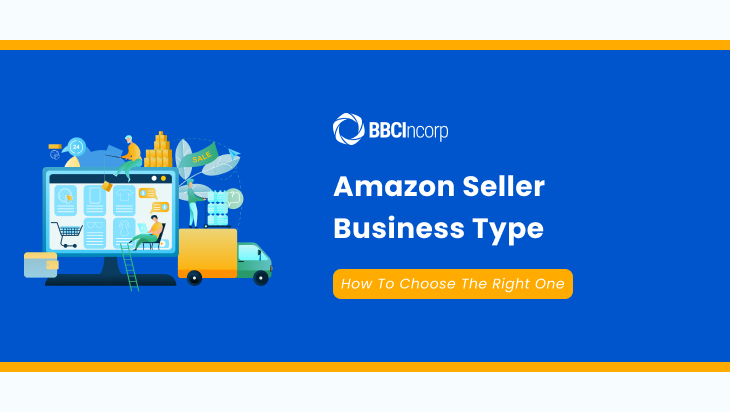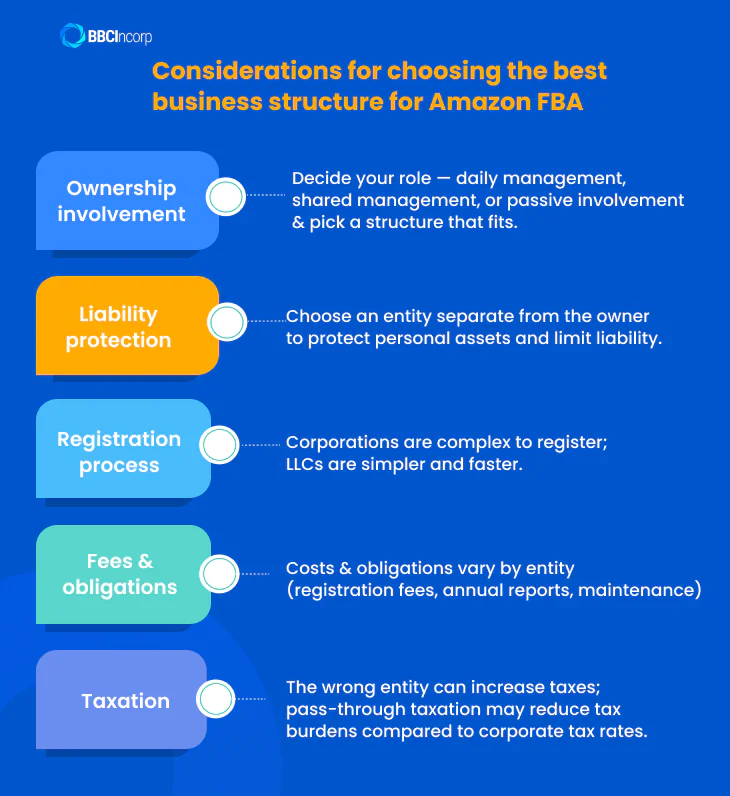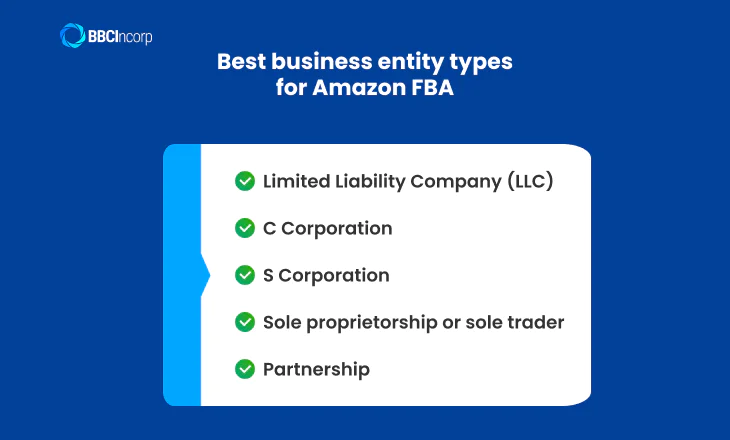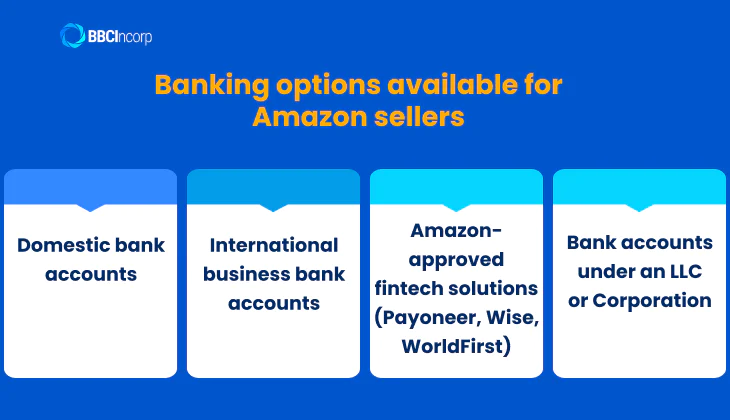
Table of Contents
Choosing the right Amazon seller business type is not simply an administrative formality. It is a strategic decision that shapes how you protect your personal assets, manage taxes, handle Amazon’s compliance checks, and scale your e-commerce operations across marketplaces.
Amazon’s ecosystem rewards sellers who operate with clarity, legal structure, and financial discipline. Whether you plan to run a small side business or build a global private-label brand, the entity you choose will determine how your business is taxed, how profits are distributed, and how investors or partners can join later.
This guide breaks down each structure in a practical, easy-to-understand way so you can select the option that best supports your long-term Amazon growth strategy.
Key Takeaways
- Choosing the right amazon seller business type is a strategic foundation for long-term operations, affecting taxation, liability protection, verification success, and scalability across marketplaces.
- LLCs are often the most practical choice for many sellers, especially international ones, offering liability protection, flexible tax treatment, and strong compatibility with Amazon banking and compliance requirements.
- Corporations (C Corp and S Corp) support growth and investor readiness, but come with stricter tax rules; S Corps are also limited to U.S. citizens and residents, making them unsuitable for most global sellers.
- Sole proprietorships and general partnerships are simple to start but provide no personal asset protection, making them better suited for testing the market rather than building a long-term Amazon brand.
- The best business type Amazon seller structure is one that aligns entity setup with a reliable banking system, ensuring smooth payouts, strong compliance, and a stable financial foundation for scaling on Amazon.
Why the right business structure is crucial for success
As a new eCommerce player in the Amazon market, you are probably overwhelmed by many decisions to make, such as determining the most suitable business structure.
While it may seem simple to register as a seller on Amazon and use the FBA program for shipping, you should be aware of product liability risks when operating an online business.
To safeguard yourself and your business from potential creditors and claimants, having a legal entity is essential. Do note that if your country is not on the list of countries accepted for Amazon seller registration(1), you won’t be able to sell directly on Amazon.
But don’t get discouraged, there are still plenty of opportunities for growth on the Amazon platform for legal business entities!
Key considerations for choosing the best business structure for Amazon FBA
Making the right decision from the get-go will save you time and money. Building a strong business base is necessary for your Amazon FBA to run smoothly.
Therefore, you may be wondering how to choose the best business entity for your company. To find the answer, consider the following factors:
Level of ownership involvement
Before deciding on the entity type, you must determine how you will get involved in Amazon’s business management. You must clarify whether you want to:
- Start the business with other members;
- Don’t want to get involved in daily business operations; or
- Be wholly responsible for the management.
After considering everything, choose the structure that matches your purpose the most.
Protected liability
As an Amazon seller, you can get complained about or sued by your customers. This tends to happen when your products are shipped with damages or faults to the buyers.
In this situation, a business entity with a separate personality from the owner will protect your personal assets. It also minimizes your liabilities for the business as the owner.
Registration process
A more complicated entity such as a corporation requires more procedures for registration. Many entrepreneurs picked an LLC to structure their business because of its simple and fast incorporation process.
Fees and obligations
Depending on how you aim for your Amazon business to grow in the future, an appropriate structure will minimize the business costs.
For company incorporation, there are several fees you must submit to the government. Such fees can be for registering the business, obtaining a registered agent, filing annual reports and taxes, or annual maintenance.
The obligations and their payable amount will vary depending on the business type. As an example, a Delaware LLC is not required to file annual reports, but it must pay an annual fee of US$300 to the Secretary of State.
Taxation
Taxation can be a challenging topic for many Amazon sellers, especially newcomers.
If your Amazon business starts generating substantial income, the wrong legal entity choice could lead to higher taxes, particularly if you’re subject to corporate tax rates on your profits.
This is because the corporate rate is almost double the personal income tax rate. In this case, an entity whose company tax is passed through the owner’s income tax will be beneficial.

Best business entity types for Amazon FBA
Considering the factors discussed above, it becomes clearer which amazon seller type of business may offer the right balance of liability protection, tax efficiency, and operational flexibility. Below are the most commonly used structures for Amazon FBA sellers and how each one fits different growth goals:
Limited Liability Company (LLC)
A limited liability company is one popular option for many entrepreneurs on Amazon. This entity has a simple but flexible structure. Owners and managers are responsible for managing the company. You can form this business entity with one or more members.
Contrary to a sole proprietorship’s unlimited personal liability, an LLC provides the owners with limited liability. You won’t be liable for any debts of the business.
In addition, your business can enjoy tax advantages because the LLC has a pass-through feature with flexible taxation regimes. Taxation of business income is the same as taxation of your personal income.
However, taxation may vary depending on the LLC’s elected tax classification, as it can be treated as a disregarded entity, partnership, or corporation for IRS purposes.
Besides, an LLC may be eligible to receive a Qualified Business Income Deduction of up to 20% according to the Internal Revenue Service (IRS).
If you want an easy-to-form entity with minimal business costs but can still protect you from personal liability for the business, an LLC is a perfect fit. However, an LLC isn’t a favorable structure to venture capitalists compared to a corporation, making it harder to raise funds from outside investors.
Moreover, if a single-member LLC does not elect to be treated as a corporation for tax purposes, it may be considered a “disregarded entity.” This means you are subject to Self-employment Tax Requirements to the IRS like a sole proprietorship.
C Corporation
While C corporations are prevalent in the company register, they constitute a smaller proportion of company formations for Amazon FBA compared to LLCs.
Below are several key characteristics of a C corporation:
- It is a separate entity from the owners, offering limited liability protection
- Its structure is the most complicated
- The entity is owned and controlled by shareholders
- You have to submit the business taxes for the company’s profits
- The registration process is more complex.
- There are more reporting and compliance requirements.
C Corporations are also subject to double taxation, where profits are taxed at the corporate level and again when distributed to shareholders. However, they avoid self-employment tax and may be beneficial for sellers who plan to reinvest profits into inventory, logistics, or expansion.
This structure is often chosen by Amazon businesses aiming to raise significant capital or prepare for long-term scaling and potential exit strategies.
If you’re starting a small Amazon business, a corporation might not be compatible with your current needs. But if you aim to secure more capital funding to expand your business or manage Amazon inventory, the C corporation could be the right choice.
S Corporation
S corporation is a special type of corporation that meets the Internal Revenue Code requirements. This entity is also structured by the ownership of shareholders. However, the number is limited to 100 shareholders and only 1 class of stock.
Similar to a C corporation, an S corporation offers limited liability to protect your assets.
Most importantly, an S corporation has a unique pass-through tax status, meaning all business profits and losses are taxed as personal income. Furthermore, it can receive deductions on qualified business income.
An S corporation can be converted from an existing LLC or C corporation. If you want to raise funds for your Amazon business and also enjoy the pass-through tax feature, an S-corporation is the ideal choice.
However, S Corporations are only available to U.S. citizens and U.S. resident individuals. Non-U.S. owners cannot form or hold shares in an S corporation, making this structure unsuitable for most international Amazon sellers.
S Corporations can also help reduce self-employment tax through a combination of salary and distribution, but they are subject to stricter IRS scrutiny and require careful compliance with compensation rules.
Sole proprietorship or sole trader
A sole proprietorship, or sole trader, is an unincorporated entity and the simplest type of Amazon business structure. You are the only member of the business, and there is no separation of legal personality.
Many sellers started the Amazon business as sole proprietors mainly because:
- There is no need to file the registration with the government;
- All generated profits and losses of the business will be yours; and
- Income tax filing for a sole proprietorship is simplified.
When you register as a seller and list your first product for selling on Amazon, a sole proprietorship will be your default entity. A sole trader may also enjoy the Qualified Business Income Deduction policy.
But what could the potential drawbacks of a sole proprietorship be?
Taxation
In certain cases, your tax may be heavier if your business makes a huge income. At the federal level, the US charges 37% of individual income for tax collection with income over $US 539,900. Meanwhile, the flat corporate income tax rate is only 21%.
As a sole proprietor, you will be subject to a self-employment tax of 15.3% to the government.
Unlimited liability
You will be liable for all potential debts and liabilities of your Amazon business because of no distinction between the business and the owner.
Suppose that you sell high-risk products involving safety and health risks (e.g. medical products, food and beverages, supplements, or cosmetics). If these products, unfortunately, do damage to consumers, your assets will be at stake.
Sole proprietors may also face challenges during Amazon seller verification, as many marketplaces prefer registered business entities for trust and compliance reasons. Scaling into private-label branding, joining Brand Registry, and opening business bank accounts may also be more difficult under a sole proprietorship.
If your goal is to experiment with your products on the Amazon marketplace or engage in casual selling for hobbies, a sole proprietorship may be suitable.
In case you envision building a brand and expanding your Amazon business, consider a business structure with a separate legal entity, such as an LLC or corporation.
Partnership
Some Amazon sellers choose to incorporate it as a partnership. This business entity is classified into two different structures: the general partnership and the limited partnership.
General partnership
In a general partnership, you’ll find some similarities with a sole proprietorship. For instance, the business is not considered a separate legal entity from its owners.
What sets a general partnership apart is that it involves multiple members who join you in the business and collectively act as co-owners.
General partners have unlimited liability, meaning each partner is personally responsible for the debts and obligations of the Amazon business. This can pose significant risk when selling consumer or regulated products on Amazon.
Example of partnership for Amazon FBA
You are selling makeup products on Amazon and your friend is selling skincare products. Your friend doesn’t make adequate profits while your Amazon business is doing well.
You want to improve the variety of your Amazon store and your friend wants to approach more buyers.
Both of you decide to form a joint business and sell your friend’s products on your Amazon channel to improve sales. As a result, you and your friend form a general partnership.
In other words, a general partnership is created by merging two or more sole proprietors.
Limited partnership
How about limited partnerships? What benefits can it offer differently from a general partnership?
If you want to invest in a company, and enjoy the profits but don’t have any responsibilities for the company’s liabilities, you can start a limited partnership.
A limited partnership includes general partners and limited partners. The general partners are responsible for managing the business operations. They are also liable for all potential debts and obligations.
The limited partnership provides crucial capital and resources for the business but without the authority to engage in day-to-day operations. Despite its similarities in tax treatment to a general partnership, owning a limited partnership entity requires registration with the government.
Limited partnerships may offer liability protection to limited partners, but general partners still face unlimited liability. This structure may also face challenges with Amazon seller verification and business banking, as incorporated entities are often preferred for compliance and trust.
As you explore the most popular entity structures, consider their compatibility with your business objectives to make the right choice.

Banking and Payment Requirements for Amazon Sellers
A reliable banking setup is fundamental to maintaining healthy cash flow, ensuring smooth payouts, and complying with Amazon’s verification standards. As sellers expand across multiple marketplaces, banking becomes more than just receiving payments, it determines how efficiently funds move, how easily accounts are verified, and how resilient the business remains during operational challenges.
In practice, setting up compliant Amazon seller accounts is not only about receiving payouts but also about meeting Amazon’s verification standards, managing cross-border payments efficiently, and maintaining stable cash flow as the business scales.
Understanding the banking framework helps Amazon sellers minimize payout disruptions and select financial solutions that support long-term growth.
Why banking matters for Amazon sellers
Amazon sellers depend on predictable payouts to manage inventory, advertising, logistics, and daily operations. Any disruption in banking can immediately affect business continuity. A proper banking arrangement ensures:
- Successful Amazon account verification (KYC) where business and banking details match.
- Consistent and timely payouts, preventing cash flow gaps.
- Support for cross-border transactions across different Amazon marketplaces.
- Reduced risks of payout holds or account suspension caused by unsupported banks or mismatched records.
- Better financial tracking and tax reporting, especially for sellers operating under LLCs or corporations.
A banking issue, even small, can delay payments for days or weeks, directly impacting inventory restocking and seller performance metrics.
Key criteria when choosing a bank account for Amazon payouts
To select the right financial setup, Amazon sellers should evaluate the following:
Amazon marketplace compatibility
- The bank or fintech provider must be accepted by the specific Amazon marketplace.
- Some regions (e.g., JP, UAE) require local bank accounts, while others accept virtual accounts.
Strong KYC and verification success
- Banks with efficient KYC procedures reduce the risk of verification delays.
- Business name, owner information, and tax details should align precisely with Amazon’s records.
Multi-currency support
- Ideal for international sellers receiving payouts in USD, GBP, EUR, or JPY.
- Minimizes conversion losses.
Transparent fee structure
- Lower transfer, withdrawal, and FX fees help protect profit margins.
Seamless integration with Amazon Seller Central
- The bank should support quick, error-free linkage for payout processing.
Reliability and payout speed
- Stable banking platforms minimize operational risk and keep cash flow consistent.
Banking options available for Amazon sellers
Amazon sellers can choose among several supported banking solutions depending on the marketplace and business model:
Domestic bank accounts
- Required for some Amazon regions.
- Offer high compliance and stable payouts.
International business bank accounts
- Suitable for sellers incorporated in the US, UK, EU, Singapore, or Hong Kong.
- Provide reliable cross-border transfers for Amazon FBA.
Amazon-approved fintech solutions (Payoneer, Wise, WorldFirst)
- Provide virtual receiving accounts in multiple currencies.
- Often preferred by global sellers due to flexibility and lower fees.
- Must be officially supported by Amazon to prevent payout rejections.
Bank accounts under an LLC or Corporation
- Increase trust during Amazon verification.
- Recommended for sellers operating professionally or scaling to multiple markets.

A well-structured banking system works best when it is supported by a properly established legal entity. For Amazon sellers who are setting up or restructuring their business, BBCIncorp provides formation assistance, helping you create a compliant foundation that keeps payouts stable and operations uninterrupted.
If your plan includes building a more structured or cross-border business model, you may also explore BBCIncorp’s overview of offshore company formation services for additional guidance on establishing an international entity that aligns with Amazon’s banking and compliance requirements.
A deeper look into company formation and bank account can also help you understand how the right legal structure and banking setup work together to support smooth payouts and long-term operational stability on Amazon.
A solid entity and banking setup together minimize payout delays, prevent verification issues, and give Amazon sellers stronger operational confidence as they scale across multiple marketplaces.
Conclusion
To sum up, LLCs, corporations, and sole proprietorships remain the most common Amazon seller business type options, with partnerships also used in certain cases. However, it is important to note that sole proprietorships and general partnerships do not provide personal asset protection, which may expose sellers to significant business and product liability risks.
Choosing the right entity depends on your operational needs, tax obligations, level of ownership involvement, and the nature of the products you plan to sell on Amazon.
If you need practical guidance to make a well-informed decision for your Amazon business journey, feel free to reach out to us at service@bbcincorp.com. We are always ready to assist you.
References:
(1): https://sellercentral.amazon.com/help/hub/reference/external/200405020
Frequently Asked Questions
Is it possible to change my business type after I’ve started selling on Amazon?
Yes. Amazon sellers can change their business structure even after launching their store. Many start as sole proprietors or a simple Amazon seller business type, and later transition into an LLC or corporation as the business grows. To change your structure, you must form a new entity, obtain a new EIN if required, update tax information, and revise your business details in Amazon Seller Central.
Keep in mind that changing your structure does not affect your product listings, but Amazon may request additional verification documents during the update process.
Do I have to be officially registered to sell on Amazon?
You do not need to register a company to begin selling on Amazon. Many sellers start as individuals, especially when testing the market. However, forming a legal entity such as an LLC or corporation is recommended once revenue increases or when liability protection becomes necessary. Registering a formal business type Amazon seller also helps with brand protection, banking setup, supplier relationships, and passing Amazon verification more smoothly.
What type of business license do I need to sell on Amazon?
Amazon does not require a general business license for most product categories. However, all sellers must provide valid tax information. Depending on your state and product type, you may need a seller’s permit or sales tax license to collect and remit sales tax. Certain items such as food, cosmetics, supplements, or medical-related products, may require additional permits or regulatory documentation. Sellers are responsible for complying with local, state, and federal regulations, even if Amazon collects sales tax on their behalf in some states.
How many kinds of sellers operate on Amazon?
Amazon broadly categorizes sellers into two groups: individual sellers and professional sellers. Beyond these account types, sellers also differ by their Amazon seller business type, including sole proprietors, LLCs, corporations, and partnerships. Each structure offers different levels of liability protection, tax treatment, and growth potential, so choosing the right model depends on your operational and long-term goals.
Disclaimer: While BBCIncorp strives to make the information on this website as timely and accurate as possible, the information itself is for reference purposes only. You should not substitute the information provided in this article for competent legal advice. Feel free to contact BBCIncorp’s customer services for advice on your specific cases.
Industry News & Insights
Get helpful tips and info from our newsletter!
Stay in the know and be empowered with our strategic how-tos, resources, and guidelines.





